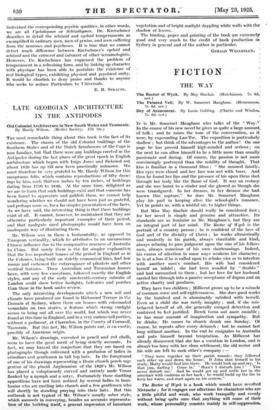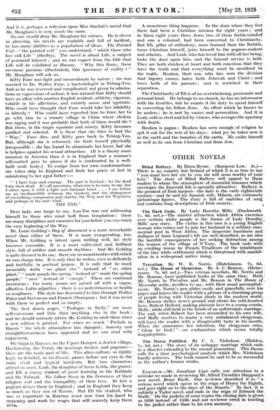FICTION
THE WAY
Day of. Atonement. By Louis Golding. (Chatto and Windus. 7s. 6d. net.) IT is Mr. Somerset Maugham who talks of the " Way.": In the course of his new novel he gives us quite a large amount, of talk ; and he raises the tone of the conversation, as it Were, by expounding Lao-Tse. The exposition is particularly shallow ; but think of the advantages to the author ! On one
• he has proved himself high-minded and serious ; on_
the next he can allow himself to be a little more than usually passionate and daring. Of course, the passion is not more. convincingly portrayed than the nobility of thought. That kiss is familiar in a thousand films : " She moaned faintly. Her eyes were closed and her face was wet with tears. And: then he found her lips and the pressure of his -upon them shot through her body like the flame of God. It was an ecstasy- and she was burnt to a cinder and she glowed as though she. were transfigured. In her dreams, in her dreams she had. known this rapture." So does Mr. Somerset Maugham, play his part in keeping alive the school-girl's romance., Yet he points us, with a wistful air, to higher things.
But Miss May Sinclair should really be considered first; for her novel is simple and genuine and attractive. Its standards are as feminine as Mr: Maugham's, but they are an integral part of her mind. The Rector of Wyck is the portrait of a country parson ; he is confident of the love of God and , of the divinity of Christ ; he works altruistically and modestly in his parish, always charitable and kind, always refusing to pass judgment upon the sins of his fellow- men, always conscious of his own shortcomings. Indeed, his excess of affection in some ways weakens his character ; lie is at a loss if he is called upon to rebuke vice or to interfere with another man's conduct. His wife had considered herself an infidel ; she had been assailed by " doubts " and had succumbed to them ; but her love for her husband carried her through into a passive acceptance of dogma and an active charity and goodness. .
They have two children ; Millicent grows up to be a miracle of common sense and self-righteousness. She does good works by the hundred and is abominably satisfied with herself. Even as a child she was rarely naughty ; and, if she mis- behaved herself at all, she generally escaped detection and contrived to feel justified: Derek'turns out more amiable ; he has some .amount of imagination and sympathy. But he drinks. He comes to church drunk one Sunday. Of course, he repents after every debauch ; but he cannot last long without another. In the end lie emigrates to Australia and puts himself beyond temptation. As Millicent has already discovered that she has a vocation in London, and is always too busy with her slum settlement,-the old rector and his wife are left to each other's company :-
" They went together on their parish rounds ; they followed each other up and down the house. If John shut himself in his study, Matty would find him there. He would look up and say, ' Is that you, darling ? Come in." Shan't I disturb you ? " You never distarb mi. And he would "get up and settle her in the armchair with cushions at her back ; he would build up the fire to keep her warm, and start again on his sermon."
The Rector of Wyck is a book which would have revolted Nietzsche ; for it. engages our affections for characters who are a little pitiful and weak, who work tranquilly and evenly without being quite sure that anything will come of their work, whose personality consists mainly in self-suppression.
And it is, perhaps, a reflexion upon Miss Sinclair's moral that Mr. Maugharn's is very much the same.
No one should deny Mr. Maugham his virtues. He is clever
in phrasing, his novels are readable and full of incident,
he has many abilities as a popularizer of ideas. The Pdinted Veil—" the painted veil " you understand, " which those who
live call Life " (Shelley). The novel is about Life, a subject of perennial interest ; and we can expect from the title that Life will be exhibited as illusory. " Why this flurry, these ravenous passions (illustrated), this ignorance of reality ? "
Mr. Maugham will ask us.
Kitty Fane was light and inconsiderate by nature ; she was married to Dr. Walter Fane, a bacteriologist in Tching-Yen. And as he was reserved and complicated, not given to admira- bons or expressions of ardour, it was natural that Kitty should have an affair with another English resident, athletic, vigorous, volatile in his affections, and entirely mean and egotistic.
Who could have thought that Fane would take her infidelity so bitterly ? Who could have expected him to force her to go with him to a remote village in China where cholera was raging and it was probable that both of them would die ? But there, in the tragic squalour and misery, Kitty becomes purified and sobered. It is there that she tries to find the " Way." Fane dies, and Kitty goes back to Tching-Yen. But, although she is reformed, she finds herself physically irresponsible ; she has learnt to abominate her lover, but she is helpless against his sexual attraction. (It is a theory more common in America than it is in England that a woman's
self-control goes to pieces if she is confronted by 'a well- built male body.) To escape from her own condemnations she takes ship to England and finds her peace at last in ministering to her aged father
I have hope and courage. The past. is finished ; let the dead bury their dead. It's all uncertain, whatever is to come to me, but I enter upon it with a light and buoyant heart . . . I see before me an inexhaustible richness, the mystery_ and' the strangenesS of everything; compassion and charity, the Way and the Wayfarer, and perhaps in the end—God.'
- THE END." •
Dear lady, one longs to say, Lao-Tse was not addressing himself to those who must bolt from temptation ; there are many disciplines and exercises for you before you can reach the very beginning of the Way.
Mr. Louis Golding's Day of Atonement is a more remarkable novel than either of these. It is more exasperating, too. When- Mr. Golding is intent upon writing well, his style becomes execrable. It is a most cultivated and brilliant style, full of artifice and smooth rhythms. And Mr. Golding is quite discreet in its use ; there are no monstrosities with which we can charge him. It is only that he writes, ever so delicately and tactfully, in poetical jargon. It is only that he must invariably write no plant elSe " instead of " no other plant," " made purple the spring," instead of made the spring purple," " save " instead of " except." There are continual inversions ; too many nouns arc paired off with a vague, effective, Latin adjective ; there is no pedestrianism or health or roughness. - The style has descended to him through Walter Pater and Stevenson and Francis Thompson ; but it was never with them so perfect and so empty.
The first dozen pages, " Prologue in . Sicily," are more self-conscious and thin than anything else in the book ; and we should seriously advise Mr. Golding to omit them when a new edition is printed. For when we reach " Prelude in Russia " the whale atmosphere has changed ; honesty and straightforwardness have appeared and we can read with enjoyment.
We begin in Kravno, on the Upper Dnieper, a Jewish village. Huckstering, the Torah, the marriage broker, and pogroMs- these arc the main part of life. This alien culture, so rigidly kept, so detailed, so intolerant, passes before our eyes in the most vivid and typical incidents. But two characters attract us most, Leah, the daughter of Serra Golda, the grocer, and Eli, a young student of great learning in the Kabbala and the Talmud. We follow them in the fierceness of their' religion; zeal and the tranquillity of their love. At last a pogrom drives them to England ; and in England they keep as much as they can of Russia. But Eli the student, who was so important in Kravno, must now turn his hand to carpentry and work for wages that will scarcely keep them alive.
A monstrous thing happens. In the slum where they live' there had been a Christian mission for eight. years:; ands in those eight years three Jews, two of them feeble-minded' and one a criminal, had been converted to Christianity. But Eli, pillar of orthodoxy, more learned than the Rabbis, turns Christian himself, joins himself to the pogrom-makers and atheists. And Leah, who has loved him with all her being, locks the docir upon him, and the funeral service is held. They are both stricken at heart and both conscious that they have the truth and that everything must be sacrificed to the truth. -Reuben, their son, who has seen the division that bigotry causes, hates both Jehovah and Christ ; and loves both of his parents ; and is wretched in their separation.
The Christianity of Eli is of an overwhelming, passionate and personal kind. He belongs to no church, he has no intercourse with the Gentiles, but he counts it his duty to spend himself in converting his fellow Jews. An effort which he knows to be useless ; he is met by curses and persecution. And it is Leah, cold as steel and led by visions, who avenges the apostasy. with death.
Reuben is pagan ; Reuben has seen enough of religion to spit it out for the rest of his days ; what joy he takes now is in the earth and the beauties of the earth. He exiles himself as well as he can from Christian and from Jew.











































 Previous page
Previous page